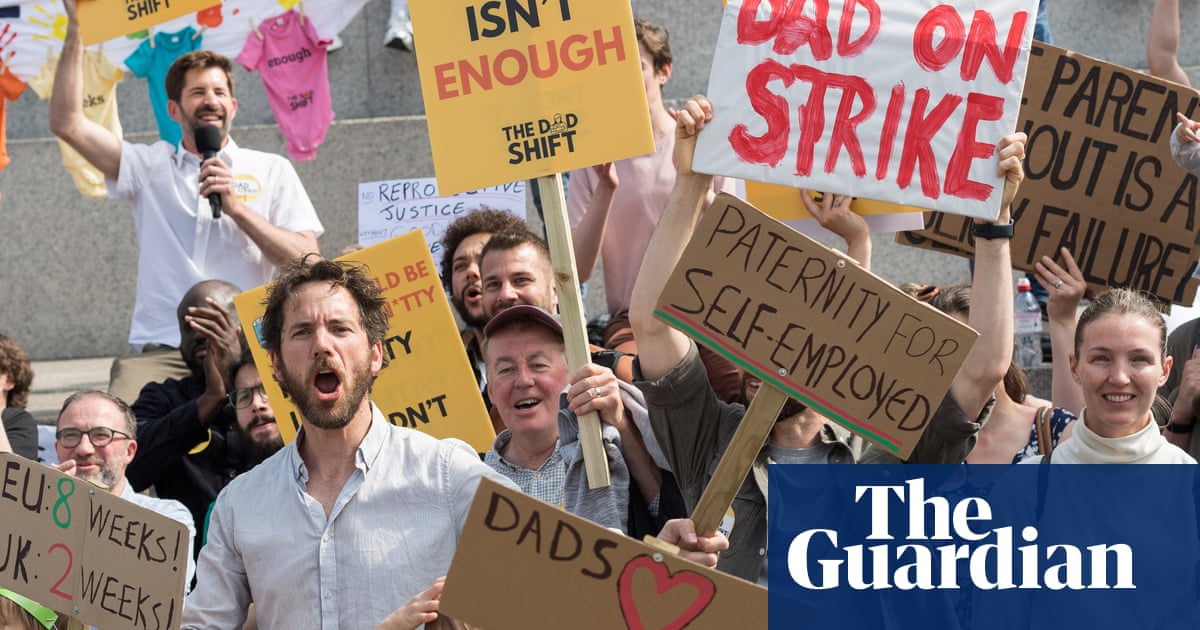Hundreds of fathers took to the streets of London and Edinburgh on Wednesday to demand better paternity leave, in a protest that was billed as the world’s first dad strike.
They came with babies in papooses and pushchairs, as they brandished placards and dad jokes to call for an overhaul of the meanest paternity leave system in Europe.
One of the signs outside the Department for Business and Trade in Admiralty Place read: “The worst dad joke: two weeks paternity leave!”
They chanted nursery rhymes adapted for the occasion. “Twinkle, twinkle, little babe, Daddy’s leave is not well paid,” went one. “The dads on the bus want time at home,” they sang in another.
A washing line was rigged up, pegged with coloured baby clothes spelling out “two weeks is not enough”.
George Gabriel, fromthe Dad Shift, the campaign that organised the protest, said: “We draw inspiration from women in Iceland who ran the world’s first women’s strike back in the 70s, when they stopped doing domestic work. As a result, Iceland has got the world’s best gender equality legislation.”
He added: “But we’re not asking for time off, we’re asking for time on. We’re downing tools at work so that we can spend time with our families.
“At the very least we want to see six weeks of paternity leave at regular pay. That was recommended by thewomen and equalities committee on Tuesday. It should be a basic minimum – the average across Europe is eight weeks. The UK paternity leave is lowest in Europe, and 40th out of 43 developed countries.”
The group says that better paternity leave would help close the gender pay gap by helping families share childcare and thereby make it less likely for new mothers to take career breaks or go part-time.
Gabriel, an IT consultant who is taking four months of paternity leave, also cited a new longitudinal study that foundaffectionate relationships between fathers and their sons reduced the risk of domestic violence. He said: “There’s a lot of pressure on fathers to protect and provide, but the research shows the most important thing you can provide your kids with is your presence. The most important way to protect our boys is to be active, healthy role models in their lives day to day.”
The prospect of a dad strike was greeted with some scepticism by those who are wary about public money funding fathers. Gabriel says: “We have had some people who accuse us of being a bunch of woke dads from east London. But the polling shows 90% of fathers these days want to be an active, more active, part of their children’s lives.”
Duncan Dragonetti, from Wiltshire, arrived at the rally after changing his daughter Thomasin’s nappy in St James’s Park. Despite the parental chores, he said he had had a “great time” spending the last four months with his daughter.
He disputes the claim that only middle-class families would benefit from better paternity pay, having witnessed the benefits of Sweden’s generous system while working for Spotify. “In Sweden, you get 480 days between both parents over 10 years. The dads have to take 90 days or they lose them, so everyone takes it and the equality in the workforce is far more balanced.”
He added: “Most modern fathers are looking to be closer to their children and want to spend their time with them.”
Richard Odufisan, who works at a construction company, came to the protest with his three-year-old son Ewa asleep in his pushchair. He says the real parenting only begins after the two-week statutory period, and that the rate should be much higher. He said: “The current rate is less than 50% of the national living wage. If you were taking on parenting as a job, legally you can’t pay some one that low. Increasing would create an incentive for fathers, particularly those on lower salaries, to take parental leave.”
Sophie Barnett was one of number of new mothers who was taking part in the protest. She came with her nine-month-old daughter Penny and her husband, James, who was allowed only two weeks of paternity leave.
She said: “You have to parent as a team, but after two weeks that team gets torn apart at a really crucial time for the baby – they don’t sleep through the night, they have to wake up every three hours to eat. James had go back to work running on empty. It was really disruptive for the whole household.”
